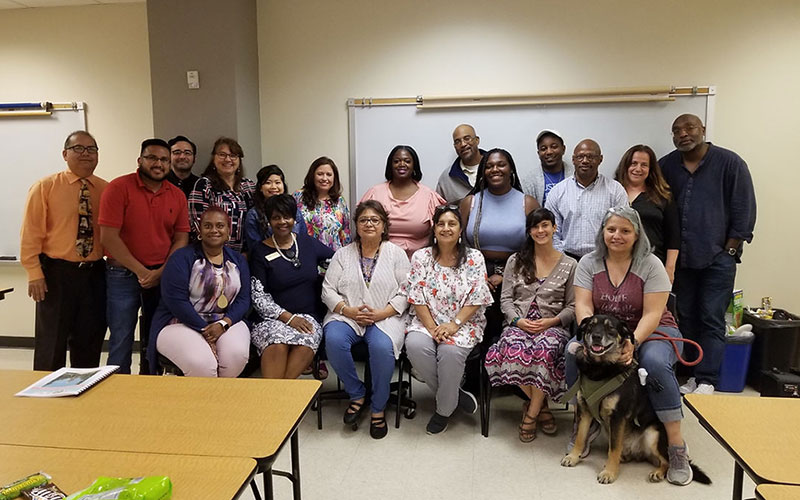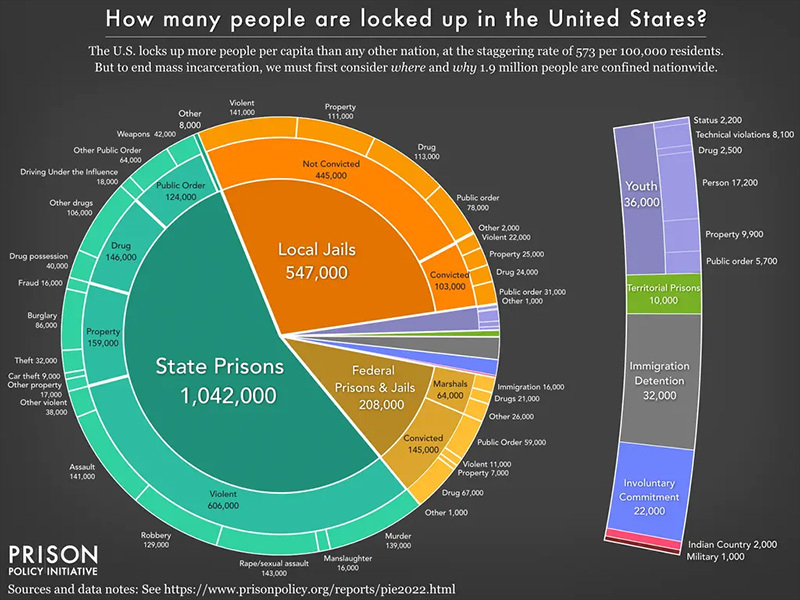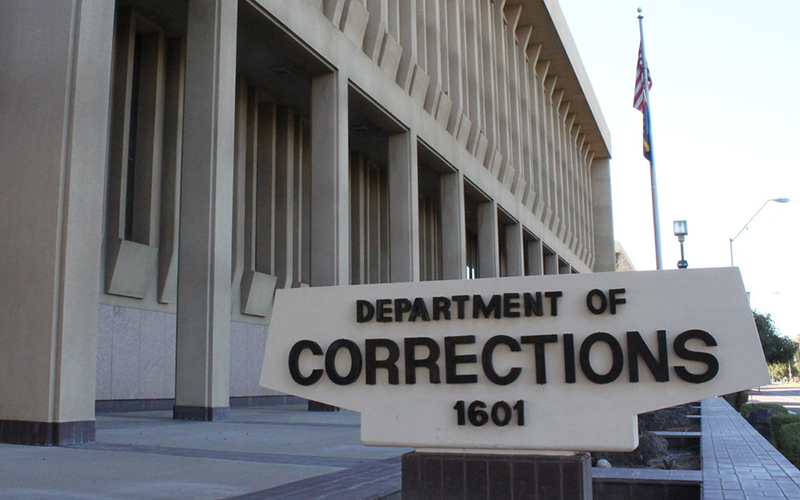
Carl Hunter, standing on the far right, joined with others affected by incarceration to start Building Promise USA, which helps those recently released from prison or jail find adequate health care and other services they need. Much of what the group does, he says, “is to change people’s minds, to say, ‘These are people, too.’” (Photo courtesy of Building Promise USA)
PHOENIX – Carl Hunter knows how hard it can be to return to society after spending time behind bars, so he’s devoted the past few years to making that process easier for others through his work at Building Promise USA.
The Austin, Texas, nonprofit is led by people like Hunter – those who once were incarcerated, in rehab for substance use, or have relatives in those situations. Now, they’re working to guide others on the path to a successful future.
One primary goal: To ensure that those starting over have access to the health care they need, especially as the COVID-19 pandemic drags on.
“Building Promise is about transforming lives and giving you choices,” said Hunter, a former heroin and crack cocaine user who has been in recovery for years. His son is serving time in a Colorado prison, giving Hunter a unique perspective on the obstacles to starting over upon release.
“A whole lot of the stuff that we’re doing … is to change people’s minds, to say, ‘These are people, too.’”
With about 2 million people locked up, the U.S. has the highest number of incarcerated people globally, according to the nonprofit Prison Policy Initiative in Massachusetts and the World Prison Brief, a program within the London-based Institute for Crime & Justice Policy Research.

Texas has the highest number of incarcerated people in the country; Arizona ranks ninth. Both states have higher rates of incarceration than the nation as a whole, Prison Policy Initiative data show.
In Arizona, the Department of Corrections has been under fire for its delivery of health care for inmates since transitioning to a privatized system in 2012.
That year, the American Civil Liberties Union and Arizona Center for Disability Law sued the department on behalf of inmates who’d received inadequate care. Millions in fines have been imposed against the agency for failing to do enough to improve conditions, and last year a judge reopened the case for trial. A ruling is pending that could force the department to make more changes or place the agency under the watch of a federal monitor.
Incarcerated people face higher rates of chronic medical conditions and viral infections, such as HIV, hepatitis B and C, and influenza, as well as noncommunicable diseases, including cancer, asthma and diabetes, research shows. Higher rates of substance use and mental illness also are prominent, and access to behavioral health care often is limited behind bars.
But the lack of quality care doesn’t end at the prison gates.
An analysis by the American Academy of Family Physicians finds that the majority of people released from correctional facilities have at least one health problem – be it physical, emotional or related to substance use – and many have multiple conditions. Rates of hospitalization are also higher among this population, the group reports.
“Upon reentry into society, prompt and continuous management of these conditions often falls by the wayside as individuals who have been incarcerated face challenges enrolling in health insurance coverage, finding a primary care physician, making health care appointments, and refilling prescriptions,” the report said. Those barriers contribute to a “particularly high vulnerability to morbidity and mortality the first few weeks after release.”
Other research finds that for those who do have access to health care after incarceration, regular engagement with services is unpredictable – in part because of how they are treated by clinicians.
Hunter, who has a master’s degree in divinity, has long served in the nonprofit sector, doing community organizing and other advocacy work. But even as he did, he struggled with substance use.
In 2017, he moved to Austin to enter rehab for about the dozenth time. When he got out months later, he started working as a fellow for a substance abuse nonprofit, helping to draft policy. He testified at the Texas Legislature on the opioid crisis, and later served as a fellow with the Hogg Foundation for Mental Health in Austin.
After learning about criminal justice policy, he partnered with his mentor, Reginald Smith, to start Building Promise USA. The group got nonprofit status in 2020, and last year won a grant from the city of Austin to coordinate reentry services for the formerly incarcerated.
“My son is serving 36 years … so I had a vested interest,” said Hunter, who’s the group’s executive director. “There are a whole lot of folks who are formerly incarcerated, but there weren’t a whole lot of folks … who were directly impacted based on the fact that they had a son or daughter or relative in jail.”
Building Promise is a peer-led, peer-driven organization. Most of its leaders either have been incarcerated themselves or directly touched in some way by the criminal justice system.
The group aims to connect those reentering society with mentors who provide guidance on employment, education, housing and health care.
“The goal is to mitigate some of what we would call the collateral consequences of their conviction,” Hunter said. “Collateral consequences could be … if you have a felony and you try to go for an apartment, they’ll take your $200, but in the back of their minds, because you have a felony, you’re not going to get this place.”
In Arizona, the Yavapai Reentry Project has a similar mission. Founded in 2011 in Prescott Valley, the organization pairs community volunteers with those recently out of incarceration and provides resources to help with housing, job training, mental health counseling and medical care.
The idea, said program specialist Kendelle Wilkinson, is to provide “someone to lean on to help achieve their goals and make healthy choices for themselves during the transition back to the community.”
“We have volunteers from the community with all kinds of different backgrounds, some with or without those similar experiences,” Wilkinson said.
In Texas, one of Building Promise’s efforts focuses specifically on getting COVID-19 vaccines to people coming out of prison. Joining with other groups, the organization offers free vaccination events that include help connecting former inmates with other health care services.
COVID-19 cases in prisons were four times higher than the U.S. rate, and as vaccines were distributed, prison populations were among the last to receive them. Research shows that states did not prioritize incarcerated people during the vaccine rollout, raising concerns about ethics and equity.
“Despite all of the information, voices calling for action, and the obvious need, state responses ranged from disorganized or ineffective, at best, to callously nonexistent at worst,” the American Civil Liberties Union said in a report on the pandemic response in prisons and jails.
Hunter said Building Promise’s vaccine events are just one way to help those who’ve already been punished, served their time and should get a second chance.
“When these men and women pay their debt to society, they should go back to zero,” he said. “They shouldn’t have a mark of Cain on their forehead that prevents them from maximizing the potential in their lives – because they have tons of potential.”


